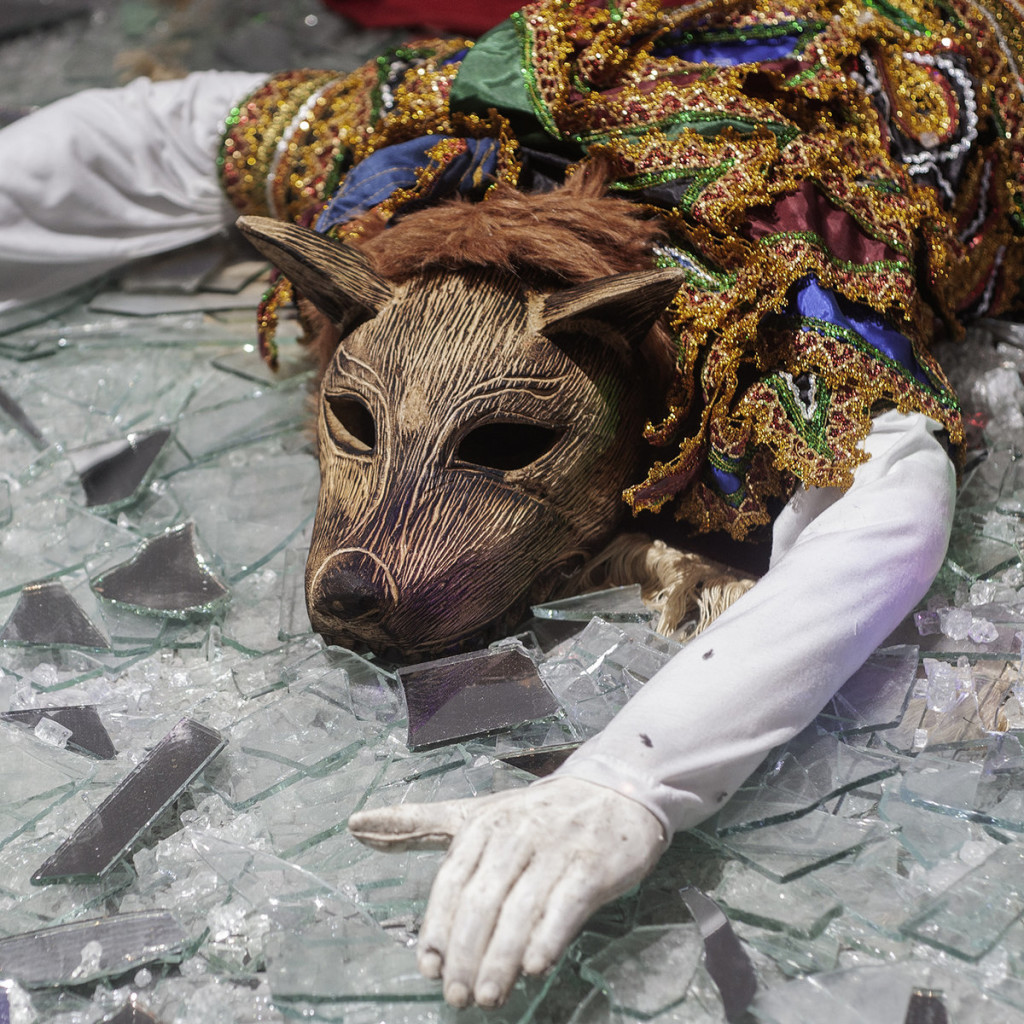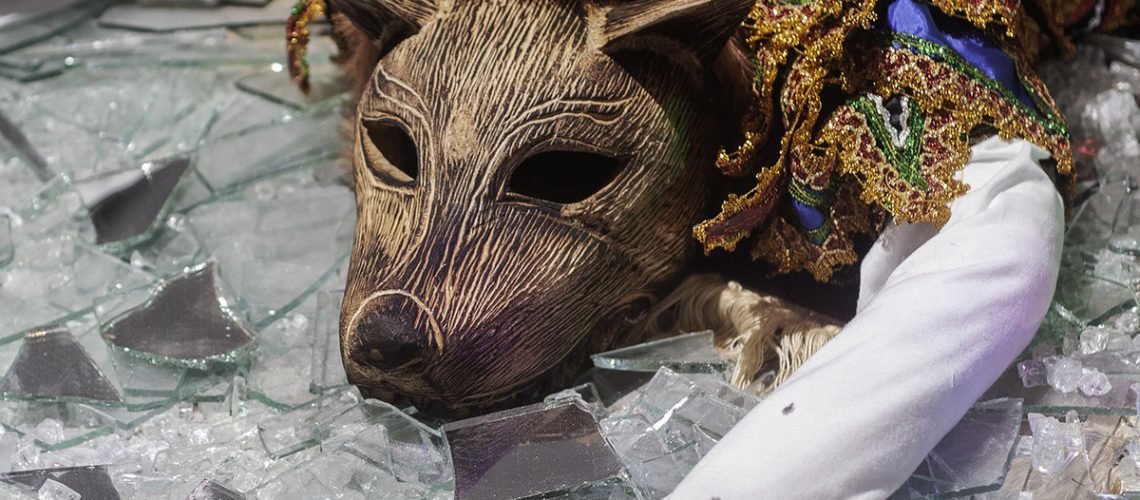Handmade instruments and electronic rhythms weave together with bone-chillingly moving vocals in the latest epic from Raja Kirik. This is serious anticolonial music: Jathilan recalls the horses enlisted in the fight against Dutch colonial forces, during a war that tore early 19th century Javanese society apart.
Pitting colonizers against locals, aristocracy against common people, demons and monsters – there’s plenty in 1820s Java that can resonate in the 2020s world. The “horse dance” – literally an “irregularly dancing horse” – is a folk dance. But as in past work of Raja Kirik – Yennu Ariendra and Johanes Santoso Pribadi – new experimental forms emerge from the folk traditions, in dizzying roars of percussion and electronics that blur the boundaries between old and new. There’s really the sense, including in the electronics and Pribadi’s handmade instruments, that the tradition is evolving naturally, and even that the electronic medium is right at home.
The process bounced between Yogyakarta and Vilnius, Lithuania, and Raja Kirik has been a regular staple of the European scene these days. There should be no exoticism here; this is every bit as relevant as electronic album as anything else, an expression of this moment.
That being said, there is a rich narrative here to explore, meaning you may need some textual guide. Yogya label Yes No Wave Music and Wok the Rok have thoughtfully detailed each dramatic scene (marked as acts), with English libretto to keep up with the action. The Javanese texts are included, too. (I’m ready for Yes No Wave Karaoke night; let’s do it.)
These came from a performance, and that drama is there, down to the feeling of the presence of the dancer, even if they’re not physically present.
Notes:

“The Phantasmagoria of Jahtilan” is a music performance by Raja Kirik in collaboration with singer Silir Wangi and performer Ari Dwianto. This project investigate the Jathilan horse dance, a folk trance dance popular in Java, Indonesia, as a way of regaining strength despite defeat. Jathilan is an acronym of “Jarane jan tjil-thilan”, which translates to a horse that dances irregularly. The current form of Jathilan developed after the Java War (fought between Javanese rebels and the colonial Dutch empire from 1825 to1830) as a folk practise to grapple with the defeat by the Dutch Empire and the devastation caused by the civil war between the Javanese population and the Javanese aristocracy who supported the Dutch. In Jathilan people use stick horses made of bamboo as a form of appreciation as well as an expression of support for rebel leader Prince Diponegoro’s horsemens who fought bravely against the Dutch colonial forces. Despite the actual defeat of the rebels, Jathilan itself always depicts an imaginary victory of the local rebel cavalry against demons, monsters, or the colonisers. This heroic performance therefore has multiple purposes: to entertain, to encourage, to heal, and to unite people against oppression.
Raja Kirik’s “The Phantasmagoria of Jathilan” is an artistic exploration of the Jathilan tradition, re-interpreting its musical, vocal, and dance forms. Syncopated electronic rhythms combine with the metallic percussion of homemade instruments that is as trance-inducing as it is bellicose. Beautifully monotonous singing in a captivating repetitive melismatic style weaves through lilting melodies that gust out of makeshift wind instruments. With frantic, seemingly endless forward propulsion, the music of Raja Kirik inhabits a wide emotional breadth, cycling from disappointment to anger to loneliness.
During the piece, the dancer embodies various heroic characters, such as Bujang Ganong, Menak Jinggo, Hanuman, or the non-fictional hero prince Diponegoro. At times the dancer also becomes a dance instructor and MC, who interacts with the audience.
released July 19, 2023
Produced by Raja Kirik
Phantasmagoria of Jathilan:
Yennu Ariendra: Electronics, Voices
Johanes Santoso Pribadi: Handmade instruments
Silir Wangi: Vocals
Ari Dwianto: DanceRecorded in Yogyakarta and Vilnius by
Yennu Ariendra and Johanes Santoso Pribadi
Mixed and Mastered by Yennu Ariendra
By the way, in other Yes No Wave Music news, it’s worth checking out the project Mother Bank and their release Tanggung Renteng. That is bank as in actual bank – an experimental mobile bank formed as emergency activism in west Java as economic security collapsed during the COVID-19 pandemic.
In the midst of labor insecurity worldwide, and as writers and actors strike in the United States in the face of AI and a lack of livable wages, plenty in the music world are also naturally wondering how they might organize. Each time this discussion comes up, though, it hits the question – but how would we strike? Who would we strike against? That’s assuming that just this one mold of organizing or collectivizing works. There are potentially other models.
In this case, the bank’s customers are band members. Using their own local ceramic instruments, they’re able to act out their own economic advocacy. And if this doesn’t make you want to go with a band to your local bank, tax authority, government, JP Morgan Chase, Allianz health insurance – yeah, nothing will.
Here’s how that goes down:
I’ll let the again detailed album “liner” notes explain. And it’s worth listening to the music. (“But it’s not electronic!” protested Wok when I said I was interested in this last month. But, I mean – it might well be more relevant than a lot of the electronic music out there now.)
Mother Bank is an experimental bank in the form of a mobile bank (emok bank) in Jatiwangi, Majalengka, West Java initiated by the artistic research group of the Badan Kajian Pertanahan (Land Studies Agency). Born as part of a wave of #emergencyactivism during the COVID-19 pandemic, the bank, which was founded in early 2021, functions as the closest and easiest economic security ecosystem for the residents of Kampung Wates, most of whom are daily workers and at that time lost their jobs. Differentiating itself from mobile banks in general, which charge quite high interest, these banks are jointly managed with a zero percent loan interest. Organically, this bank is a place for mothers in the village to learn, share, grow, create, move together.
One of Mother Bank activities is a music group in which the customers are the band members. Using ceramic music introduced by Jatiwangi art Factory —which has now become traditional music in Jatiwangi, this music group conveys the experiences of its customers as women who live amidst the changing landscape of the Jatiwangi region towards the largest manufacturing industrial area on the island of Java. As a group, the Bank also advocates for itself in the midst of land conflict issues faced by residents of Kampung Wates and seven other villages with the Indonesian Air Force, since Indonesia declared its independence.
Carrying the title and spirit of ‘Tanggung Renteng’ which means shared responsibility, this album shares the experiences of women as itinerant bank customers who survive by ‘digging a hole-closing a hole’, witnessing how rice fields slowly turn into factories, the enthusiasm of young Jatiwangi women who flock to become laborers, the ritual of paying wages for the workers to buy fast food, the efforts of women to utilize the land by planting, to the collaborative process of Mother Bank members with ceramic women craftsmen from a village in Borobudur, Magelang.
— Bunga Siagian (Badan Kajian Pertanahan/Land Studies Agency)
yesnowave [no https cert, sorry – hey we should help them out with that]
Yes No Wave Music @ Bandcamp




